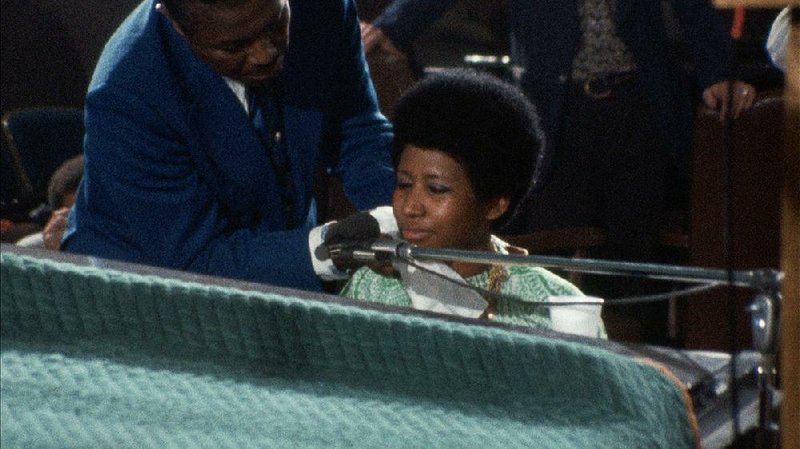Apart from some staggering problems brought on by incredible dunderheadedness — the filmmakers didn’t use clappers when they started filming, making it practically impossible to synchronize the picture with the sound until digital technology came along — one of the biggest obstacles keeping Amazing Grace from the theaters all these years was Aretha Franklin.
While she publicly praised the film, she blocked its release. Privately, she didn’t like it. Artists can be like that — T Bone Burnett can’t stand the production on his classic 1983 album Proof Through the Night. I know writers who can’t bear to read their own work. Maybe Franklin saw — or more likely heard — something that was beyond our ken. Maybe her standards were just that high.
Amazing Grace
90 Cast: Concert film with Aretha Franklin, Rev. James Cleveland, Alexander Hamilton, Bernard Purdie, Chuck Rainey, Clara Ward
Directors: Sydney Pollack, Alan Elliott
Rating: G
Running time: 1 hour, 29 minutes
Anyway, Amazing Grace is one of the best concert films ever made. Put it on the shelf with Stop Making Sense, The Last Waltz and Prince’s Sign O’ The Times. It’s a remarkable snapshot of a remarkable couple of days in early 1972, when the Queen of Soul sang with her collaborators, the Southern California Community Choir led by Rev. James Cleveland, in front of the congregation (and special guests that, on the second night, included Mick Jagger, Charlie Watts and Franklin’s father, Baptist preacher C.L. Franklin) of New Temple Missionary Baptist Church in Watts.
The main purpose was to record a double album that would become her best-selling record ever, and the best-selling gospel album of all time, Amazing Grace.
Almost as an afterthought, Warner Bros., the corporate parent of Franklin’s label Atlantic Records, hired up-and-coming director Sydney Pollack to capture the performance on film.
Pollack brought a team of camera operators and sound people — and made a rookie mistake with the clappers. It wasn’t until almost 50 years later that former Atlantic producer Alan Elliott painstakingly went through the footage to marry the sound and vision. (And earned himself a co-director credit.)
But Pollack isn’t exactly the goat here; his footage captures the visceral power of the performance — not just that of Franklin and Cleveland’s choir but also the preternatural lift of drummer Bernard Purdie, guitarist Cornell Dupree and bassist Chuck Rainey. This a direct, unfussy document, a verite eye taking in the proceedings. There’s nothing extraneous, no talking-head interviews or virtuous camera movements. Pollack and his team seem to have undertaken the filming as a solemn errand — they turn on the lights, let the cameras run and the spirit charge through the venue. There’s no need to manufacture drama when Aretha Franklin is at the microphone, at the piano, glowing and incandescent.
It might be helpful to understand that in 1972, blaxploitation films were having a moment. Shaft had been in theaters the year before and Melvin Van Peebles’ Sweet Sweetback’s Baadasssss Song was an underground hit. (Warner Bros. initially planned to bundle Amazing Grace with the coming Superfly as a theatrical double-feature, a notion that doesn’t sound so crazy when you consider Curtis Mayfield’s remarkable soul funk soundtrack.) Black faces were just beginning to appear on American TV in leading roles; the second night of Aretha’s show also marked the debut of Sanford and Son on NBC.
Aretha Franklin was close to her peak — 29 years old and, like the rest of America, coming out of a tumultuous period when it seemed the nation might crack open. It wasn’t four years after the murders of Martin Luther King Jr. and Bobby Kennedy. Just the week before, President Richard Nixon had announced his intention to run for re-election; the day of the first show he announced that half of America’s troops in Vietnam would be pulled out by May 1.
If you’ve heard the record you won’t be surprised by the power and precision, the emotive pulse, of Aretha’s voice. (In fact, some of the album recordings, which had the advantage of being remixed and augmented in the studio, are superior to the movie’s soundtrack.) But what the film provides is proof of how thrilling she was in the moment, and her gobsmacking effect on the witnesses who, time and time again, the camera catches in unabashed awe. She’s shockingly good.
And she’s doing it — they’re doing it — live. Without a net. This is genuine. This is authentic. This is the evidence.
There were giants in those days.
